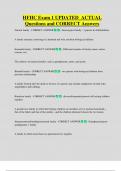HFHC Exam 1 UPDATED ACTUAL
Questions and CORRECT Answers
Nuclear family - CORRECT ANSWER - Stereotypical family - 2 parents & child/children
A family structure consisting of a husband and wife and their biological children.
Extended family - CORRECT ANSWER - Different branches of family (aunts, uncles,
cousins, etc)
The relatives of nuclear families, such as grandparents, aunts, and uncles.
Blended family - CORRECT ANSWER - two parents with biological children from
previous relationships
A family formed after the death or divorce of a parent; may include stepparents on both sides,
stepchildren, half-siblings.
Binuclear family - CORRECT ANSWER - divorced/separated parents still raising children
together
A postdivorce family in which the biologic children are members of two nuclear households—
that of the father and that of the mother—and the children alternate between the two homes.
Intergenerational/multigenerational family - CORRECT ANSWER - Grandparents/great-
grandparents + family
A family in which more than two generations live together.
,Ecomap - CORRECT ANSWER - Roles of family members within unit and society (are
they disciplinarian, bread winner, financial stability, nurturer)
Visual representation of how the family unit interacts with the external community environment,
including schools, religious institutions, occupational duties, and recreational pursuits.
Genogram - CORRECT ANSWER - family tree - who is in family unit
Visual representation of gender showing lines of birth descent through the generations.
Helicopter parenting - CORRECT ANSWER - overbearing, heavily involved
Overparenting, often referred to as helicopter parenting, refers to the overinvolvement of parents
in their children's lives
Authoritarian - CORRECT ANSWER - sets rules with no deviation, strict, dictatorship
Authoritarian parents tend to be punitive and adhere to rigid rules, or to be more dictatorial. This
style sets firm limits, and those limits or rules are not negotiable or open to any discussion.
Parents expect family beliefs and principles to be accepted without question. Children have no
opportunity to participate in the family decision-making process. Children with authoritarian
parents do not develop the skills to examine why a certain behavior is desirable or how their
actions might influence others.
Authoritative - CORRECT ANSWER - Clearly marked rules, family unit all has input,
discusses as a group
Authoritative parents use firm control to set limits, but they establish an atmosphere with open
discussion or are more democratic than authoritarian parents. Limits for behavior are clear,
consistent, and reasonable, but the children are encouraged to talk about why certain behaviors
occurred and how the situations might be handled differently another time. Parents set and stick
to established routines, so children have clear expectations of appropriate behavior. Authoritative
parents provide explanations about inappropriate behaviors at a child's level of understanding.
, Children are allowed to express their opinions and objections, and some flexibility is permitted
when appropriate. However, parents make it clear that they are the ultimate authority for
decisions. Children with authoritative parents develop a sense of social responsibility because
they converse about their responsibilities and approaches.
Permissive - CORRECT ANSWER - Not setting limits, no clear rules
Permissive parents show a great deal of warmth, but set few controls or restraints on the
children's behavior. Parents are so intent on showing unconditional love that they fail to perform
some important parenting functions. Children are allowed to regulate their own behavior.
Discipline is inconsistent, and parents may threaten punishment but not follow through. Because
the parents do not impose any controls on the children, the children end up controlling the
parents.
Family development - CORRECT ANSWER - how people/families grow and change over
time
The dynamics or changes a family experiences over time, including changes in relationships,
communication patterns, roles, and interactions.
Cohesion - CORRECT ANSWER - how well the family unit works together
The emotional bonding between family members.
Resiliency - CORRECT ANSWER - how well the family unit deals with issues/stress
The ability to function with healthy responses, even when experiencing significant stress or
adversity; the personal patterns, behaviors, or processes that promote an individual's recovery
from or adaptation to adversity.
Limit setting - CORRECT ANSWER - rules/limits are needed for healthy development




